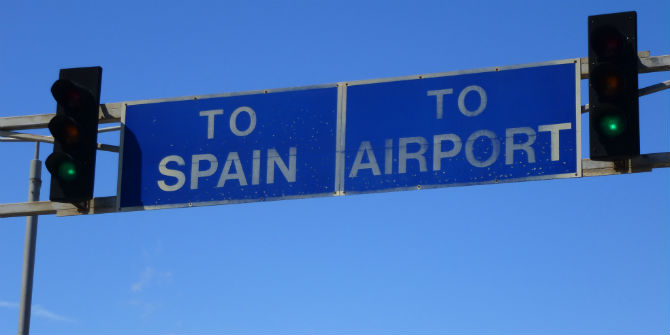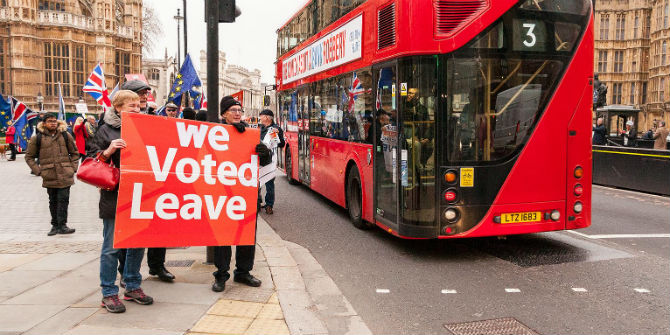 Gibraltar’s border with Spain, and its economic dependence on financial services, mean it has a lot to lose from a hard Brexit. Chris Grocott (University of Leicester) looks at the implications of a new Spanish government and the departures of Boris Johnson and David Davis.
Gibraltar’s border with Spain, and its economic dependence on financial services, mean it has a lot to lose from a hard Brexit. Chris Grocott (University of Leicester) looks at the implications of a new Spanish government and the departures of Boris Johnson and David Davis.
June’s change in the Spanish government has been welcomed in Gibraltar. The hard-line Partido Popular has been replaced by a coalition led by the more progressive Partido Socialista Obrero Español (PSOE). Combined with the departure of the Brexiters David Davis and Boris Johnson, Gibraltar’s prospects in the Brexit negotiations may be improving.
For the purposes of Brexit, the UK has two borders with EU countries. The largest, of course, is that shared by Northern Ireland and the Republic of Ireland. While the Gibraltar frontier with Spain is considerably smaller, the issues faced there are no less thorny.

In 1973, Gibraltar joined the then European Economic Community as a UK overseas territory based on continental Europe. But the government of General Franco had closed the frontier between Spain and Gibraltar in 1969, meaning that there was little point in applying freedom of movement for goods and workers to Gibraltar. Despite the frontier reopening fully in 1985, these exemptions remain in place.
Gibraltar’s unique situation means that it was already used to operating under something like a hard Brexit regime. But as Brexit approaches, two principle concerns stand out. Will the Spanish government use the Brexit negotiations to leverage concessions on sovereignty over Gibraltar from the UK government? This could be backed up with the threat, or implementation, of severe disruption at the frontier. Second, given Gibraltar’s economy depends heavily on financial goods and services, would the Rock be able to trade these within the EU using its traditional links to the City of London?
Between the Brexit referendum and May 2018, the government in Madrid had two successive Partido Popular foreign ministers who cultivated different styles in their approaches to Gibraltar and Brexit. The first, José Manuel García-Margallo, took a bellicose position towards Gibraltar. Not long after the referendum, he vowed to ‘plant his flag’ on Gibraltar. Margallo’s successor, Alfonso Dastis, was more measured. Yet despite these differing styles, the EU’s decision to insist that any arrangements relating to Gibraltar and Brexit are bilaterally agreed between the UK and Spain further encouraged the Partido Popular’s traditionally belligerent attitude towards to Gibraltar. The party’s insistence that joint use of the Gibraltar airport – including joint customs and border control – be part of any agreement was seen by many in Gibraltar as an attempt to weaken British sovereignty over the Rock.
For Gibraltar, which relies upon around 10,000 workers crossing the frontier daily from Spain to work on the Rock, the major fear has been that Spain might disrupt the frontier if their Brexit demands were not met. With the collapse of the Partido Popular-led coalition government, there may now be some cause for reassurance. The new government coalition is led by the PSOE, whose position on Gibraltar has been more inclined towards compromise.
Traditionally the PSOE has championed a policy of ‘osmosis’ towards Gibraltar. It hopes that by creating strong links between Gibraltar and its hinterland, over time Gibraltarians will feel integrated enough into Spanish culture and society to be willing to discuss, at the very least, some form of joint sovereignty. While there is no evidence that such a policy would bear fruit in the short term, as a long-term goal it depends upon an open frontier and more conciliatory tone. Spain will no doubt go to the polls again later this year, but for the time being a PSOE-led government should provide a welcome change in attitude and policy and the possibility of a smoother Brexit for Gibraltar.
The second major concern of the Gibraltar government – will the Rock still be able to trade financial goods and services through the City to the EU – rests more generally upon the outcome of the wider Brexit negotiations. Davis and Johnson were seen by the popular press in the UK, and by some in Gibraltar, as solid advocates of Gibraltar’s position within the negotiations. Whether they were truly helpful to Gibraltar’s cause, however, is doubtful. Their hard Brexit stance alienated them from the Prime Minister’s office and from European partners, both collectively and bilaterally. By contrast, both the Foreign Office and the Department for Exiting the European Union are now led by ministers loyal to the Prime Minister. In the latter department, Dominic Raab is notable for having consulted for the Foreign Office on issues relating to Gibraltar. And while there is no obvious link between new Foreign Secretary Jeremy Hunt and Gibraltar, he is unlikely to antagonise a delicate situation in the same way as his predecessor did.
A soft Brexit that keeps the UK integrated into most aspects of the European economy, negotiated in such a way as to prevent an exclusionary veto from Spain, is vital to the Rock’s future. A less hardline government in Madrid, and more influential, pro-soft Brexit ministers in the Foreign Office and DExEU, suggests that this may be more likely than it was.
This post represents the views of the author and not those of the Brexit blog, nor the LSE.
Dr Chris Grocott has written extensively on the history, politics and economy of Gibraltar. He is co-author of Gibraltar: A Modern History and in January 2017 gave oral evidence to the House of Lords EU Select Committee enquiry on Brexit and Gibraltar.






